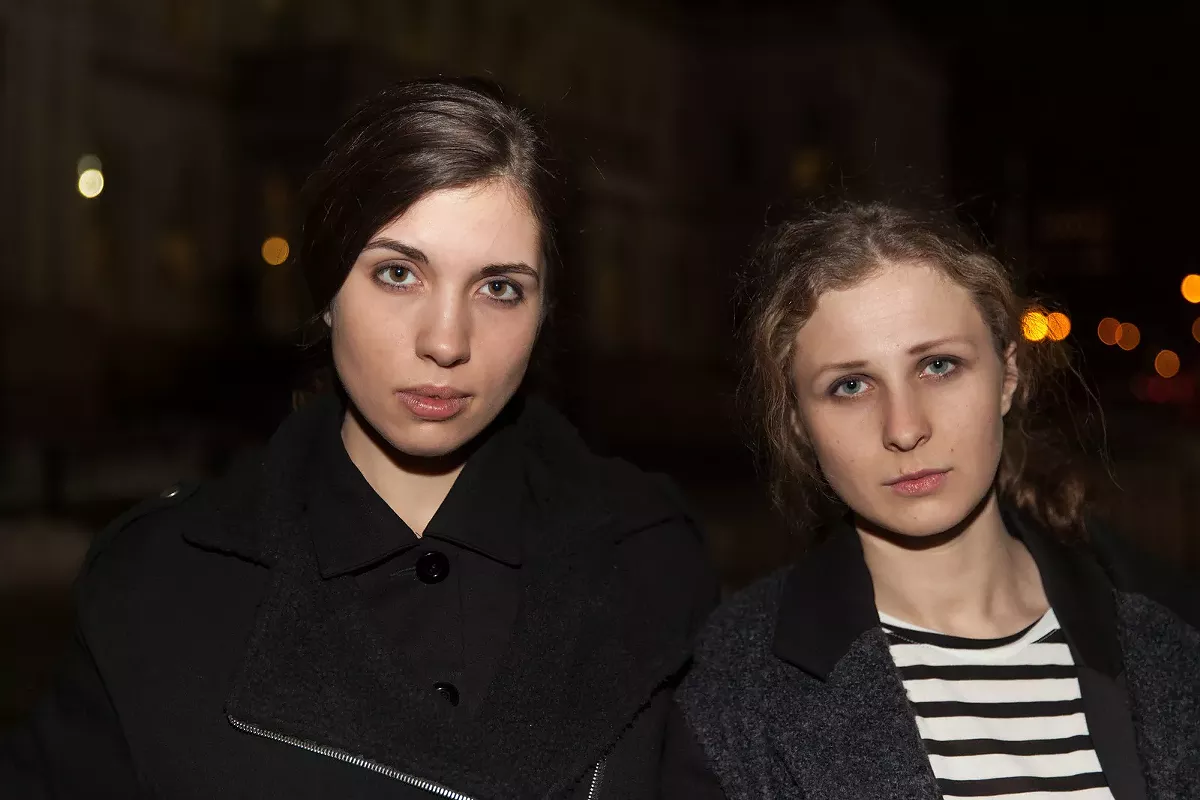

Audio By Carbonatix
[
{
"name": "GPT - Leaderboard - Inline - Content",
"component": "35519556",
"insertPoint": "5th",
"startingPoint": "3",
"requiredCountToDisplay": "3",
"maxInsertions": 100,
"adList": [
{
"adPreset": "LeaderboardInline"
}
]
}
]
It's 5 a.m. in Russia by the time Nadya Tolokonnikova and Masha Alekhina are finally settled for the night in Chicago, where they've just arrived by plane. Even after losing a bag at the airport and getting stuck in Chicago's infamous traffic, they're gracious enough to agree to keep our Skype date. Though they seem to be able to understand us perfectly, they speak in a mix of mostly Russian and little English, with the help of a translator. Despite their weariness from traveling — or perhaps because of it — they're prone to fits of laughter, sometimes laughing so hard that we wonder if they're actually laughing at us and not with us.
Their light mood is impressive, considering the hell they've recently gone through in their homeland of Russia — and will continue to go through as long as they remain members of the masked anti-Putin punk rock guerilla protest group Pussy Riot. In 2012, Tolokonnikova, now 24, and Alekhina, now 26, were sentenced to two years of jail for "hooliganism motivated by religious hatred" — that is, performing an anti-Putin "Punk Prayer" in a Moscow cathedral. In jail, the women faced brutal conditions, and were forced to spend long hours a day sewing police uniforms.
Since their early release in late 2013, the two have shifted their focus from combating Putin to instead fighting for prisoners' rights around the world. After an engagement speaking at a panel at Chicago's Riot Fest, Tolokonnikova and Alekhina will make their way to Ann Arbor on Thursday, Sept. 18 as part of the Penny Stamps Distinguished Speaker Series. The lecture will be presented by the Stamps School of Art and Design, the Weiser Center for Emerging Democracies, and the Institute for Research on Women and Gender.
Metro Times: What is Pussy Riot? There's elements of punk rock, of performance art, and also protest in what you do. Is it all of those things? Is it none of those things? (Both women giggle.)
Nadya Tolokonnikova: The reach of what we do lies in contemporary art, and protest and activism and political activism. After several years of following this path, we started doing music. This is where the roots come from.
MT: What's the current makeup of Pussy Riot? How many members are there? Are all members based in Russia currently?
Masha Alekhina: Pussy Riot over recent years has turned into something more like a movement, and it wouldn't be right to distinguish it and set a limited number of people who are in it. People come and go. That's just the way it is. We often hear, for example, in Europe, people do some things and want to present themselves as Pussy Riot as well.
Tolokonnikova: Obviously, Pussy Riot was started as a protest first of all against the Russian state. But as we travel and talk to actors around the world, we do sense the fact that our methods can and should be utilized for solving problems that people face in other countries. We think this is a form that obviously should be used in other countries and other situations to try to achieve some of the results that people want.
MT: Did it start off as a female-only collective? Is it still that way, or is it not so concerned with gender at this point?
Alekhina: We tried to step aside from the female-only image of the group. For example, at our last performance, there was a man taking part in the action, who was wearing a dress, during the collision with [the vigilante paramilitary group] the Cossacks at the Sochi Olympics. Right now we decided to broaden this particular approach and not limit the collective only to women.
Tolokonnikova: We did have plans to expand the needs of the collective much earlier, but since we were sent to jail practically several months after Pussy Riot started actively performing, we didn't have time to put those plans into effect. Among our plans was the only Pussy Riot performance at a gay pride performance in Moscow in May 2012, but we were arrested two months before that.
MT: Nadya and Masha, you've become the public faces of Pussy Riot. Was that a choice, or were you forced to reveal your identities?
Tolokonnikova: Obviously, this didn't happen completely due to our will, because it's very difficult to keep a balaclava [ski mask] on in a courtroom. It gets taken off of you. This is the way it happens. We would try to send balaclavas to prisons as well, but they were taken away and not let through by the prison authorities. You could say that all that happened to our image happened sort of naturally, without our will.
MT: There was an incident earlier where other members had declared you no longer members of the group. Is there still dissent within the group regarding who is a member?
Tolokonnikova: The members we know and we are in contact with — they have not expressed any problems with the way we communicate and behave, because everything we do together with them.
Alekhina: Pussy Riot is not an army. Somebody can't be excluded from Pussy Riot just as you can't actually include someone in Pussy Riot. Everything just happens quite differently.
MT: Where did the idea for the neon-colored balaclavas come from? It's instantly-iconic — but there's also an element of humor there.
Tolokonnikova: The first idea was to bring the nature of anonymity to the whole cause, but when we put on these usual black and gray balaclavas, we realized that we looked too much like the law enforcement forces in Russia, like Putin's soldiers. So we decided to be a bit more friendlier and started using colorful balaclavas.
MT: A large part of your performances seem to center on humor and absurdity — like the idea of a punk rock show in a church. [Tolokonnikova and Alekhina laugh ... really hard. We start to worry that we said something wrong.]
MT: ... but the things that you're fighting for are gravely serious. Would you say that you're using humor and absurdity as a weapon?
Alekhina: Russia is built with absurdity. In this case, you just cannot step away from using it as a main tool. [Both laugh again.]
Alekhina: This has been a very important instrument in trying to solve the topics that we focus on. In the Russian parliament, they are seriously trying to initiate discussions on whether cigarettes should be sold to women without the consent of their husbands. They want to ban high heels and nylon stockings and even lingerie. The country has absurdity, which you have to utilize to talk about anything.
MT: You've recently launched MediaZona, which is a news website that focuses on prisons and arrests. That's a different tone than the guerilla protests — it's more of a serious news website. Are you moving away from the protests?
Tolokonnikova [in English]: Did you see that site? Is it seems boring for you?
MT: It looked like it was Russian-centric. [Both laugh.]
Alekhina [in English, in a tone that does not sound like it was directed at us]: It is a problem.
Tolokonnikova: The thing is, that we started not only MediaZona, but also Zona Prava, a kind of "zone of rights." It's consequences of our prison term.
Alekhina: After we witnessed what we were able to witness in prisons, we do feel that we have an obligation. So, in this case, we did have to choose to work in this way.
MT: You went on a tour of prisons around the world. Is that a part of your protests?
Alekhina [in English]: We tried to do some projects about prison economy and prison forms, generally. We want to make this project before Putin will be gone. We want to be prepared when Putin leaves country. This is why we have experiences in other countries and try to find the best for the Russian prison system.
Tolokonnikova: The German prison is great. We visited the Berlin women's prison, and I think it is one of the best examples of the liberal system can work in the prison system in general. We could talk with prisoners. Some of these women could talk in Russian, so the prison guards couldn't listen. These women told us sincerely what they want to tell. They have a liberal approach to work. The inmate can work, and she can choose work or not. Most of them like to work because conditions are quite [good] and it's paid quite well for an inmate, so they can afford cigarettes and some extra food, like candies or fruits.
Prisoners are able to communicate with each other freely. The administration does not try to set them up against each other. They are able to lead normal lives. They are even able to sleep with each other after placing a special request with the authorities. All this is happening down there because the prison boss is a former abolitionist. He fought against the prison and prisons as a concept, then he decided to join the system to try and change it. He is able to make all of those changes because he honestly believes in them.
Things are not as good in American prisons. We talked to American NGOs and researchers who study this question — the SUNY College in New York state — the John Jay College of Criminal Justice also gave us some insight and shared their research with us. We are in contact and try and understand the problems of the United States criminal system, as well.
MT: We've spoken with some prisoners here in Michigan. They said there aren't enough educational opportunities — if you want to learn to be a mechanic or learn a trade, you have to try to get transferred to another prison.
Tolokonnikova: In Russia, women can't be a mechanic. Not all American prisons use slave labor, but in Russia, 30 percent of Russian prisons use labor that could be described as "slave labor." If you look at women's prison, 90 percent could be labeled as "slave labor."
MT: We read that the prison you were in housed a sewing factory, but also "an experimental vocational program to re-train women prisoners to become digital cartoon animators." That thing about "digital cartoon animators" sounds very strange; can you elaborate on that?
Alekhina: This was in fact an experiment which was running in the prison region that I was in. It was associated exclusively with a very liberal governor in that region who helped install this program to produce cartoons into Russian institutions for women. After this governor was fired by Putin and a new regional government was installed, this program shut down quickly. Now all these women are back to sewing police uniforms, just as everyone else.
MT: What's it feel like to get out of prison?
Tolokonnikova: We didn't want that amnesty, it was a public relations stunt!
[At this point the translator indicates that Tolokonnikova and Alekhina are feeling tired from their travels, so we decide to wrap it up.]
MT: We read you were fans of Iggy Pop. Are there any other Detroit punk rockers you admire?
Tolokonnikova: We are big fans of our friend Wayne Kramer of the MC5, and he's doing great work in US prisons with his Jail Guitar Doors program.
MT: One last thing — you were both spotted on the set of the new season of House of Cards. Are you fans, and can you elaborate on your involvement?
Tolokonnikova: We unfortunately can't comment on our involvement on House of Cards. But we are all fans. — mt
Pussy Riot will speak at 5:10 p.m. on Thursday, Sept. 18 at the Michigan Theater, 603 E. Liberty Street, Ann Arbor; 734-936-0671; stamps.umich.edu; admission is free and open to the public.






